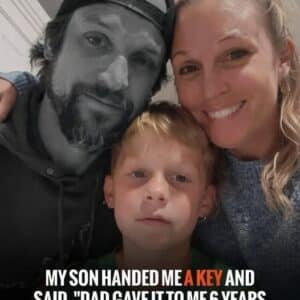I didn’t think much of it when my daughter said she wanted to do something different for Halloween. Lily is seven—she says a lot of different things. It wasn’t until a stranger showed up on our porch the next morning with a cardboard box and a quiet smile that I realized how much her “different” could change people.
I’m Elena, thirty-three, a night-shift nurse in a small Ohio town that always smells like cut grass in the summer and wood smoke when the weather turns. It’s not glamorous work, but it’s honest, and it keeps the lights on. I’ve been a single mom since Lily was two. Her dad slipped out of our lives like a bad date—no calls, no birthdays—just the clean snap of an ending. We’re better off. It’s been me, Lily, a two-bedroom rental with creaky floors, and a kitchen that always carries a hint of cinnamon because I bake when I’m tired, which is often.
Holidays are where I overdo it. I can’t give Lily much in the way of big things, but I can give her magic—paper bats on windows, a string of fairy lights around the porch, a pumpkin on the steps with a lopsided grin. Halloween is her favorite. She plans her costume for months. Or… she used to.
A week before Halloween, I was stirring pasta sauce and humming to an ’80s playlist when she looked up from a page of crooked pumpkins and said, very calmly, “I don’t want to go trick-or-treating this year.”
I laughed at first. “Since when?”
She shrugged, chewing the end of her crayon. “I want to go to the nursing home instead. The one down the street. They can’t go trick-or-treating. I could bring them treats.” She said it like she was proposing we pick up milk on the way home.
“You want to give out candy instead of getting it?” I asked.
“Yeah. And maybe decorate a little. Spooky but happy. So they feel… important.”
That word landed in my chest and stayed there. At seven, my main Halloween moral struggle was whether to trade my brother for his fun-size Milky Way. My girl was thinking about a quiet rec room nobody visits.
“Okay,” I said, throat tight. “Let’s do it.”
We turned the kitchen into a cheerful disaster. Flour on the chairs, cinnamon in the air, melted chocolate on Lily’s cheek like war paint. We baked until almost eleven—pumpkin cookies, sugar ghosts, chocolate-chip bats. She insisted we bag each cookie and tie it with thin orange ribbon. Then she wrote notes in her best bubble letters, tongue sticking out in concentration: You are loved. Happy Halloween from your tiny ghost friend. You’re special.
Her costume was the simplest one she’s ever worn—an old sheet cut into a ghost with big felt eyes and pink circles for cheeks. “Do I look spooky?” she asked, spinning. “Like a marshmallow with opinions,” I told her, and she cackled like a cartoon witch.
Halloween morning was gray and brisk. We carried a tote of cookies into Maplewood Assisted Living. The nurse at the desk looked up, surprised. “Visiting hours are almost over,” she said gently.
Lily lifted her bucket. “I’m not visiting,” she said. “I’m treating.”
We followed the nurse into the rec room. A handful of residents sat scattered like loose beads on a string—wheelchairs, walkers, the TV murmuring to no one in particular. The one bowl of candy corn looked both sad and suspicious.
Lily didn’t hesitate. She went person to person, her little ghost sheet swishing around her sneakers. “Hi! I’m a friendly ghost. I brought you cookies.” She asked for names. She complimented sweaters. She told terrible jokes. A man with an oxygen tube blinked at her and smiled. “My wife used to make cookies like that,” he whispered. Lily took his hand like it was the most natural thing. “I can make them for you now,” she said. “So you don’t miss her too much.”
The room changed. Laughter threaded the quiet. A woman in a leopard-print shawl put on a plastic crown from the “just in case” costume stash Lily had insisted on bringing. A man by the TV—famous, apparently, for not finding much funny—grinned when Lily handed him a bag and said solemnly, “This one is special because you look like a very good listener.”
By the time we left, cheeks were flushed, and the bowl of candy corn was still full, but the residents weren’t. They were filled with something warmer. Lily fell asleep on the couch that night, still in her ghost sheet, clutching her stuffed bunny like a sidekick who’d finally gotten a good day.
I thought that was the end of it—a beautiful page in the thick book of small moments we’re trying to write. The next morning someone knocked on our door with the kind of knock that makes your stomach drop. A man in a dark coat stood on our porch with a cardboard box.
“Ma’am,” he said, careful and formal, “are you the mother of a little girl named Lily?”
All the worst possibilities bloomed and burst in one second. “Yes,” I managed. “Is something wrong?”
His face softened. “Not the way you think,” he said. “I’m the director at Maplewood.” He held out the box. “We wanted to bring you something. From the residents.”
Inside were cards. Dozens. Some carefully printed, some shaky with effort, some edged in glitter like confetti had leaned in to help. Thank you. You made my day. Bless that little girl. One that I had to sit down to read: I hadn’t smiled in months. You reminded me I’m still here.
My eyes burned. He reached into his coat and held out a white envelope. “There’s one more thing,” he said. “The residents pooled part of their holiday fund for Lily. Maybe for college someday. Or maybe just for more cookie ingredients.”
I tried to give it back. He lifted a hand. “You didn’t ask. They insisted.”
Then his voice softened even more. “Mr. Jacobs—the man with the oxygen—passed last night. Peacefully, in his sleep.” He handed me a folded sheet of notebook paper. The letters wandered on the lines, and the message was steady: You reminded me of my wife’s kindness. Tell your daughter she made an old man happy on his last day.
I didn’t bother to hide my tears. The director tipped his head. “Your daughter brought more life into that room in one hour than we’ve seen in months,” he said, and walked back to his car, leaving me holding a box that weighed almost nothing and everything.
Lily padded into the living room with her hair in sleepy spirals. “Mom? Why are you crying?” She climbed into my lap and traced the glitter on the first card with one finger, lips moving as she sounded out the words. “They liked the cookies?” she asked, hopeful.
“They loved the cookies,” I said. “And Mr. Jacobs left you a note.”
“He died?” The fact of it arranged itself across her small face—sad and serious and somehow steady. She hugged her bunny. “Then I’m glad I went,” she said. “Maybe he wasn’t scared anymore.” She looked up. “Can we go back next weekend? For Thanksgiving stuff?”
We went back the next Saturday with paper turkeys and cranberry muffins and a garland made of yarn loops and construction paper leaves. When we walked in, the nurses clapped. Someone had painted a banner that read: OUR LITTLE GHOST WITH THE BIG HEART. Lily stood there, hand over her mouth, and whispered, “Mom, they made me a sign.” She wore Edna’s costume-bead necklace for the rest of the day. Harold tried to teach her checkers and forgot the rules, so they made up new ones and laughed until they had to stop to breathe.
A local paper picked up the story after a nurse posted a photo of a tiny ghost handing a bagged cookie to a man with a leopard-print blanket on his knees. Maplewood’s foundation wrote to say a downtown bakery wanted to sponsor Lily’s “cookie missions” for every holiday. There was an anonymous donation to start a college fund; later we learned it came from Mr. Jacobs’ daughter. Lily listened to me read the letter and whispered, “That means I can be a real baker someday.”
“You already are,” I told her.
By December we were regulars. Lily retired the ghost sheet for a Santa hat and a sweatshirt with a sparkly snowman and brought cinnamon stars and cranberry muffins. She signed her cards: From your tiny ghost friend, now your Christmas elf. When we left, a man in a red plaid vest called, “You’re our good luck charm!” Lily spun, shouted “Merry Christmas!” and nearly tripped on her own boots.
A local radio station invited “the cookie girl” on air. Lily answered questions with the clear logic of seven: “They looked sad, so I brought cookies. Then they looked less sad. So we’re going back.” The host laughed until he sniffed and blamed it on the studio’s air conditioning. The bakery called after and said, “Tell us what you need for Valentine’s. We’re in.” A craft store donated supplies. A scout troop asked to tag along. The town that smells like grass and smoke and cinnamon got a little sweeter.
The truth is, none of this started as a plan. It started as my kid deciding that getting candy is great but giving it might be better. It started with a sheet-ghost who wrote You are loved in bubble letters and meant it.
We still have a creaky rental and a porch swing that leans. I still clock in at night and count meds and hold hands through the dark. Lily still tangles her hair and gets glitter on everything. Our life didn’t transform into a movie montage. It just shifted its weight, a little, toward the good.
Every time we go back to Maplewood, Lily’s routine is the same. She asks names, she listens like it’s her job, she hands over something warm wrapped in plastic and tied with ribbon. She tells people her bunny once captained a pirate ship through a spaghetti storm. Edna wears her beads and says, “Picture day!” Harold forgets the rules to every game and wins anyway. Someone always calls Lily by a grandchild’s name and then catches themselves, embarrassed, and she says, “You can call me that if you want,” like it’s the simplest gift to give.
Sometimes, on my way to work, I think of Mr. Jacobs. I think about how a girl in a ghost sheet and a bag of cookies tucked a little piece of tenderness into his last day. I think about how the box of cards sits on our bookshelf now, next to a jar of leftover orange ribbon, a quiet reminder that small kindnesses are still the strongest medicine I know.
At bedtime, when Lily’s breathing evens out and the house settles, I stand in the doorway and look at her—the flour freckles that never really wash off, the necklace of plastic beads resting on a pajama top, the hand curled around a well-traveled bunny. She didn’t choose the easy thing. She chose the kind thing. And it keeps choosing her back.
This is what different looks like, I think. Not grand. Not viral. Not perfect. Just a kid in a sheet with a big heart and a note that says you are loved, and a room that believes her.





